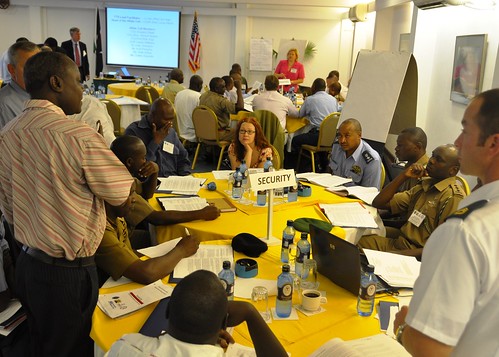We spend millions of dollars on new equipment and somewhat less on training our people who operate the equipment. That is understandable. The problem is that we spend even less on training Key Decision Makers, who, arguably, are extremely important during a disaster or incident.
Decision makers are responsible for the following:
Decision makers are responsible for the following:
- Planning
- Information Management
- Tracking and controlling resources
- Communicating
- Making decisions
Let's look at these roles in detail:
- Planning: Who made the plan? Do we even know if it works? Will it work in the worst case scenario? Is the plan accessible or even followed during a disaster or an event?
- Information Management: How do decision makers get experience managing large quantities of information outside of a disaster? Practice makes perfect, but how do you have realistic practice for something as dynamic as information management?
- Tracking and controlling resources: Doing this during an actual event is much harder than during a tabletop exercise. Also we bring people in to the EOC who are experts in a particular domain (police, fire, EMS, etc.) - what OTHER training is required to give them the expertise to employ and make decisions in other domains? What about operating in an EOC environment? The military has a one-year course to help officers transition to a Staff Officer role - what are we doing? Tabletop exercises allow us to "talk" about what we would do, rather than actually "doing" it.
- Communicating: One of the most prevalent problems is communication issues between the responders, the EOC and other agencies and departments. How do we get better at this? Tabletop exercises don't really allow effective and realistic practice for communications and Live or Full Scale exercises are costly and can only be run infrequently.
- Making Decisions: How do you give someone the confidence that they are making good decisions during a disaster or emergency? They need practice, but realistic practice is very difficult outside of an actual event.
So herein lies the problem. We have people in the EOC who play key roles, who have come from the field and may or may not have experience operating with other organizations. The current training methods are wanting or very costly, and the decisions they are expected to make have a very large impact on the overall response.
How do you solve this problem?
Luckily about 35 years ago, the military came up with a training methodology for key leaders that can be modified and brought over to the EM world.
No, we don't have to train to be tank commanders or naval task force commanders. This training methodology is called Constructive Simulation and it has the potential to greatly assist training key leaders and decision makers. The military realized that it was hugely expensive to run large scale "functional" exercises to train leaders. Even though everyone was in the field, these exercises also always had some limitations on training. The other leader-focused training was Tabletop exercises. Sound familiar?
Constructive simulation uses a computer to play the part of the "field" (Police, Fire, EMS, civilians, the disaster/emergency event, the buildings and terrain). The EOC personnel interact with the on-scene personnel exactly how they would in real life - by telephone, radio, email, etc.. The on-scene personnel, instead of controlling ACTUAL resources in the field, control the resources in the computer. They watch what is going on, report back to the EOC and implement any instructions. From the viewpoint of the EOC, the training is nearly 100% realistic.
Constructive simulation exercises cost much less to run (about as much or less than a Tabletop) but provide vastly improved training. We ran a country-wide exercise in Jamaica last summer and they said that they learned much more during the two day Constructive Simulation exercise as they had during two previous functional exercises for which they paid $7M.
Constructive simulation bridges the gap between expensive functional exercises that can only be run infrequently and tabletop exercises, which are great as a walk-through, but are not realistic or extremely effective.

fire and safety courses in chennai
ReplyDeletefire and safety course in chennai
safety courses in chennai
safety course in chennai
construction safety course in chennai
industrial safety course in chennai
electrical safety course in chennai
offshore safety course in chennai
nebosh courses in chennai
safety engineering courses in chennai
Industrial safety engineering courses in chennai
fire and safety engineering courses in chennai
Iosh course in chennai
fire and safety courses in chennai
fire and safety engineering courses in chennai
occupational health and safety courses in chennai
offshore training courses in chennai